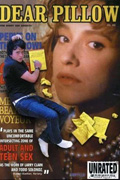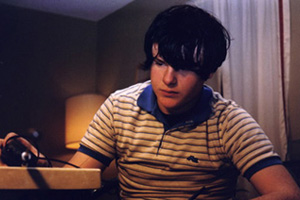 Sexuality is one of the more difficult topics to broach in cinema. This is because viewers have eyeballs. When a filmmaker uses graphic nudity to make a non-pornographic point, the visceral visual shock threatens to overwhelm the intellectual agenda. On the other end of the spectrum, when a filmmaker takes a softer approach, the material tends to feel too safe and watered down. In print, the most titillating text is still just words on a page; on screen, the most innocent nudity remains actual human nudity. So how can a filmmaker discuss sexuality frankly and openly in a movie without going too far? Onur Tukel (Ding-a-ling-LESS) and Bryan Poyser (Dear Pillow) have come up with a clever solution: do it with language. Neither of these accomplished and under-seen low-budget comedies is graphic in a Shortbus-ian sense, yet their scripts are stuffed with enough explicit sexual material to make a grandmother shriek. What is so impressive about both Ding-a-ling-LESS and Dear Pillow is how sweet and inoffensive they remain, even at their most X-rated. It’s inexpressibly rewarding to discover two filmmakers who have chosen exceptionally smart dialogue over nudity and graphic sex in order to tackle such provocative material.
Sexuality is one of the more difficult topics to broach in cinema. This is because viewers have eyeballs. When a filmmaker uses graphic nudity to make a non-pornographic point, the visceral visual shock threatens to overwhelm the intellectual agenda. On the other end of the spectrum, when a filmmaker takes a softer approach, the material tends to feel too safe and watered down. In print, the most titillating text is still just words on a page; on screen, the most innocent nudity remains actual human nudity. So how can a filmmaker discuss sexuality frankly and openly in a movie without going too far? Onur Tukel (Ding-a-ling-LESS) and Bryan Poyser (Dear Pillow) have come up with a clever solution: do it with language. Neither of these accomplished and under-seen low-budget comedies is graphic in a Shortbus-ian sense, yet their scripts are stuffed with enough explicit sexual material to make a grandmother shriek. What is so impressive about both Ding-a-ling-LESS and Dear Pillow is how sweet and inoffensive they remain, even at their most X-rated. It’s inexpressibly rewarding to discover two filmmakers who have chosen exceptionally smart dialogue over nudity and graphic sex in order to tackle such provocative material.
Ding-a-ling-LESS is the story of a small town young man, Jack (Kirk Wilson), who doesn’t have a penis (he was accidentally castrated at birth and his parents’ useless lawyer fumbled the case). When his sex-hungry friend, Alan (a brilliant Robert Longstreet), discovers an exciting new surgery that can give him the body part he’s always wished he had, he begins to teach Jack what it means to have a dick. Tukel’s screenplay has enough penis puns for five or six Hollywood films, and while it arguably has a lighter overall agenda than Dear Pillow, it nonetheless makes many valid points about how men are consumed by sex to a dangerous degree. Tukel pushes that concept a step further in the film’s climax, suggesting that the only way for a true chauvinist to conquer his sexual dependence is through castration.
Ding-a-ling-LESS is certainly not for everyone, as its comedy is crude and unflinching, but Tukel directs the X-rated story like it’s an innocent fairytale. This keeps it feeling more like a live-action episode of The Simpsons than a comic entry in the Cinemax After Dark canon. Even at its darkest, it is still light and sweet. Credit must be given to the entire cast—most notably, Wilson and Longstreet—which brings these characters to life with unexpected warmth.
 Dear Pillow treads in similarly X-rated waters. Wes (an incredibly natural Rusty Kelley) is a teenager who lives in an apartment complex with his dad (Cory Criswell). He befriends his older next-door neighbor, Dusty (Gary Chason), who writes porn for a living. When Wes discovers a female tenant in the building who dabbles in phone sex, the trio contemplates crossing the line from imagination into reality. With Dear Pillow, Poyser has his sights set on the convoluted concept of pornography, how it has the potential to be a healthy tool but instead tends to warp people’s perspectives in a negative way. He understands that showing the act itself would distract viewers, and so he ingeniously creates a situation that allows him to have it both ways. No one will accuse Poyser of taking the easy way out. In fact, what he has accomplished is a rather remarkable feat. Dear Pillow is a thoroughly provocative work that uses bracing sexual language and situations to investigate pornography without ever becoming pornographic itself.
Dear Pillow treads in similarly X-rated waters. Wes (an incredibly natural Rusty Kelley) is a teenager who lives in an apartment complex with his dad (Cory Criswell). He befriends his older next-door neighbor, Dusty (Gary Chason), who writes porn for a living. When Wes discovers a female tenant in the building who dabbles in phone sex, the trio contemplates crossing the line from imagination into reality. With Dear Pillow, Poyser has his sights set on the convoluted concept of pornography, how it has the potential to be a healthy tool but instead tends to warp people’s perspectives in a negative way. He understands that showing the act itself would distract viewers, and so he ingeniously creates a situation that allows him to have it both ways. No one will accuse Poyser of taking the easy way out. In fact, what he has accomplished is a rather remarkable feat. Dear Pillow is a thoroughly provocative work that uses bracing sexual language and situations to investigate pornography without ever becoming pornographic itself.
What makes these films feel like such a perfect double feature is not merely their striking tonal balance between X-rated explicitness and PG-rated sweetness. It is that they are both so genuinely funny. What unifies them even further is that they are out to provoke thoughts in addition to laughs. One can watch both Ding-a-ling-LESS and Dear Pillow and marvel at such sharp comedic writing, but they also cannot deny the more serious issues beneath their comic skin.
There is one more thing that ties these films together, and it is what makes their lack of more widespread attention so disappointing. Usually, even when taking into account films that have much bigger budgets, the most well written screenplays lose something in the conversion to the screen. Whether this can be attributed to poor direction or inexperienced actors, the fact remains that these worlds become thinner and less credible than they were on the page. But in both Ding-a-ling-LESS and Dear Pillow, Tukel and Poyser show a striking knack for eliciting extraordinarily naturalistic performances from their actors, which brings a reality to their universes that is refreshingly convincing. Together, these films prove that good writing, acting, and directing will always be more important than a film’s production value or budget.
— Michael Tully
(Buy Ding-a-Ling-Less and Dear Pillow at Amazon. They deserve to be seen, whether separately or together.)









